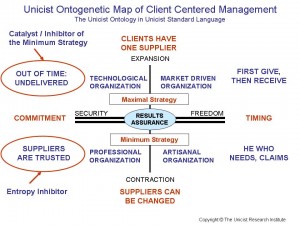The following excerpt is a repost of the Unicist Blog.
Client Centered Management is a breakthrough and a back to basics to provide an adequate environment to grow. It is a management model that was developed to establish the rules for an optimum use of the company’s energy so as to satisfy its internal and external clients. When talking about the external client in the company we necessarily refer to the customer and the shareholder.
CCM is a meta-model to provide result-assurance, client orientation and secure added value to an organization. It is the natural model to expand businesses.
The principles that integrate the CCM meta-model are:
1. Divide the processes into client-supplier units
This division aims at determining which operating units have a clear “output” so as to be suppliers and which have a clear “input” so as to be considered clients.
2. Minimize intermediaries
This principle follows the natural concept of “the larger the number of intermediaries, the bigger the entropy”.
3. Services or products received are paid for
This principle makes the organization become more aware of costs and benefits and enables negotiating goals to obtain measurable and predictable results.
Maximal Strategy:
4. Each client has only one supplier
The principle that each client has only one supplier defines the role of the supplier which drives towards a solution driven approach and not only a task driven approach.
5. First giving, then receiving
It implies that services are paid for once rendered and not during the rendering process or in advance. There can be grounded exceptions to this in the organization.
6. Delivered out of time is considered undelivered
In practice, it ends up in an incentive system for each delivery on time and a punishment system if the dispatch is made out of time.
Minimum Strategy:
7. Every client may change his supplier
The organization’s success is given by its capacity to satisfy the clients’ needs. This obliges the organization to manage the unfulfilled situations a supplier may have.
8. He who needs claims
“He who needs claims” is a principle based on the KANBAN approach which is closely associated with the natural tendency of satisfying one’s own needs.
9. Each supplier counts on his client’s trust
One of the basic principles of any successful large company is having a high reliability level. Reliability and trust are “sine qua non” principles for CCM’s application.

